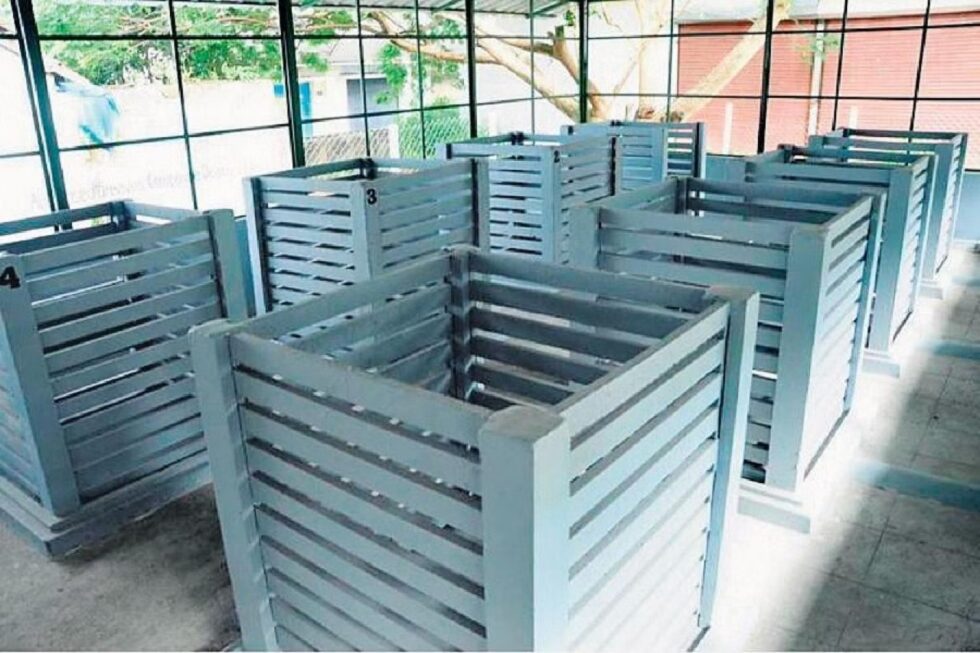
By Amal Chandra
CPPR YLF Fellow 2023
Urban centres worldwide are grappling with the challenge of managing increasing volumes of waste generated by growing populations. In this pursuit, innovative and sustainable waste management solutions are essential. One such solution that has gained prominence is the use of Aerobic Bins, specialised waste management containers designed to facilitate the aerobic decomposition of biodegradable waste.
These bins are proving to be a pivotal element in promoting composting and alleviating the strain on landfill sites, thereby contributing to more efficient and environmentally- friendly waste management practises.
Aerobic bins stand out from traditional waste containers due to their unique design, creating an environment conducive to the aerobic decomposition process. Unlike anaerobic decomposition, which occurs in landfills and produces harmful methane emissions, aerobic decomposition occurs in the presence of oxygen, resulting in the generation of heat and nutrient-rich compost. This compost can be harnessed as a valuable soil conditioner for gardening and agriculture, offering a sustainable way to recycle organic waste materials.
In the context of waste management evolution, the Thiruvananthapuram City Corporation took a bold step towards a ‘decentralised approach’ after the closure of its centralised waste plant in 2013. There were flaws in the initial implementation stage of this strategy; for instance, the declaration of ‘clean wards’ by the Corporation in 2016 reflected a lack of serious concern from the side of authorities. This resulted in open waste dump sites in many parts of the city. In response, Aerobic Bins were introduced under the ‘My City, Clean City Project’ in 2017. This is after the successful experiment of the ‘Thumboormuzhi Model’ Aerobic Bins at various locations of Alappuzha town around 2013-2014. These bins come with well-engineered features that facilitate air circulation and drainage, creating an optimal environment for the aerobic decomposition process. The dimensions of these bins, measuring 1.45 metres in length, 1.45 metres in breadth, and 1.2 metres in height, house a leachate pipe with a diameter of 110 mm and a square slurry chamber measuring 45 cm. Within approximately 90 days, the waste material within these bins undergoes composting, a natural process that can potentially be enhanced through scientific research aimed at modifying bacterial activity.
In the pursuit of eco-friendly composting, the 90-day transformation period of Aerobic Bins poses a potential challenge: a wait that, if underestimated, could lead to overflowing waste and mounting concerns.
Therefore, the journey towards efficient waste management is not without its challenges. Post the adoption of the decentralised disposal strategy in 2017, the Corporation faced criticism for inadequate upkeep of the Aerobic Bins. This issue prompted some action in 2022, although primary research revealed a significant number of non-functional bins. Coinciding with this concern, the government initiated efforts to establish new waste management centres and expand composting capacities across the city. This shift from a situation of ignoring to harness the potential of Aerobic Bins to a proactive expansion phase underscores the necessity of regular inspection and maintenance to ensure their sustained functionality. The system needs to be consistent.
Empowering the community mechanisms using QR codes on disposal centres and the Smart Thiruvananthapuram App offers a direct line for residents to promptly alert authorities if Aerobic Bins reach capacity or encounter operational issues.
It is crucial not only to address immediate concerns but also to foster the sustainability and efficiency of the entire waste disposal system. The road to effective waste management demands a holistic approach, incorporating innovative technologies alongside vigilant oversight and adaptable strategies. For example, to bolster the efficacy of Aerobic Bins, the government could consider introducing real-time monitoring through IoT sensors, enabling immediate alerts when bins are nearing capacity.
Moreover, investing in community awareness campaigns and incentivizing responsible waste segregation and disposal could maximise citizen participation, while periodic maintenance checks and swift troubleshooting mechanisms could ensure the seamless functioning of Aerobic Bins in the system.
Implementing user-friendly mechanisms and amplifying people’s role in decentralised waste management requires a concerted effort. Furthermore, constant upgrades to the existing infrastructure are imperative. The marketing of compost produced through aerobic decomposition can serve as a sustainable revenue stream. The private sector can also play a pivotal role in waste management by contributing innovative technologies, expertise, and resources.
Public education campaigns should be intensified to raise awareness about the benefits of waste segregation and the proper use of waste management infrastructure. This effort can be supplemented by revising the Kerala Municipality Act to allocate distinct responsibilities to Corporations and Municipalities separately, thereby ensuring more focused and effective waste management strategies. It is advisable to establish a dedicated urban waste management department with urban experts on staff to address these complex issues. This step will facilitate streamlined governance, expert coordination, and comprehensive planning, ensuring that waste management receives the attention it deserves. By directing our focus specifically to the enhancement of
Aerobic Bin utilisation, strategic steps can be taken to maximise their impact.
Alongside the aforementioned suggestions, exploring options for smaller bin sizes in high-density areas and expanding the network of collection points could optimise convenience and participation. Collaborating with technology partners to provide information on nearby bins, usage guidelines, and even rewards for responsible disposal could further engage residents. As cities continue to grow, these forward- looking approaches offer a beacon of hope for cleaner urban environments. The idea of urbanity goes beyond mere clusters of buildings and institutional systems; it truly emerges when a city adeptly manages all its civic affairs, guided by a responsible attitude that seeks continuous transformation and progress. In conclusion, embracing innovative solutions like Aerobic Bins can pave the way for more decentralised, sustainable, and efficient waste management in urban areas.




